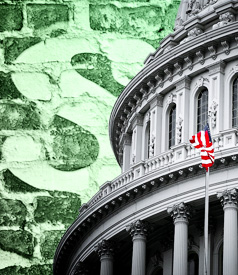Did you know that Truthout is a nonprofit and independently funded by readers like you? If you value what we do, please support our work with a donation.
Washington – The Senate moved a crucial step closer Thursday to passing a historic overhaul of the financial regulatory system, voting 60 to 38 to cut off debate on the measure, virtually assuring passage as soon as later in the day.
The 2,323-page bill will trigger the biggest financial regulatory changes since the Great Depression of the 1930s. It aims to put new government rules and tools in place to prevent a repeat of the 2008 financial industry meltdown that helped send the nation’s economy reeling.
“It is not a perfect bill. I will be the first to admit that,” said Senate Banking Committee Chairman Christopher Dodd, D-Conn., just before the vote. “But we believe we have done the best we could under the circumstances to see to it we never have another bailout of a major financial institution at taxpayer expense.”
Republicans wouldn’t relent in their opposition. Thirty-eight voted to stall the bill, while 57 Democrats, joined by Republicans Olympia Snowe and Susan Collins of Maine and Scott Brown of Massachusetts, voted to cut off debate. Sen. Russell Feingold, D-Wis., was the only Democrat to vote no. Sixty votes were needed to end debate under Senate rules.
Most GOP senators insisted that the Senate was making a grave mistake.
“This is simply another example of the majority party’s preference for a one size fits all regulatory structure stifling economic growth,” said Sen. Saxby Chambliss, R-Ga.
The House of Representatives passed the bill last month. Once the Senate approves, it goes to President Barack Obama for his signature.
The measure would be the third major legislative triumph for Obama since he took office 18 months ago. Like his other signature initiatives _ last year’s economic stimulus and the health care system overhaul passed earlier this year _ the financial regulation bill got virtually no Republican support.
The bill, the product of painstaking negotiations _ largely among Democrats _ would set up a new consumer agency to write rules for credit products such as mortgages, student loans and credit cards; require federally insured financial institutions to spin off riskier investments and make it easier for the government to break up large institutions that have financial problems.
That breakup authority is considered one of the bill’s most significant changes. During the 2008 economic collapse, the only option for troubled firms was bankruptcy, but that would have put shareholders and creditors at odds with one another and sowed doubt throughout the financial world, perhaps spreading panic.
Thursday, the differences between the two parties over the bill remained stark, and the debate throughout the day was one likely to be heard on the campaign trail in the three and one-half months until the Nov. 2 congressional elections.
“As it turns out, the American people don’t seem to like this government-driven solution to the financial crisis any more than they liked the Democrats’ government-driven solution to the nation’s health care crisis,” said Senate Republican Leader Mitch McConnell of Kentucky.
“They don’t think this bill will solve the problems in the financial sector any more than they think the health care bill will lead to lower costs or better care.”
Democrats readily conceded that the bill wasn’t perfect, but contended that should be seen as an important, even bold, step toward curbing potential abuses.
“This bill corrects a regulatory structure that today allows reckless gambling on Wall Street, that creates too-big-to-fail, where government bailouts are necessary to keep companies afloat because there’s no other option,” said Sen. Ben Cardin, D-Md.
One of the Republicans’ key arguments was that no one knows if the bill could prevent a 2008-style collapse.
“The Democratic majority chose to adopt legislative language penned by federal regulators in search of expanded turf,” charged Sen. Richard Shelby of Alabama, the senior Republican on the Banking Committee. “They chose to legislate for the political favor of community organizer groups and liberal activists seeking expansive new bureaucracies.”
Countered Dodd, “I can’t legislate integrity. I can’t legislate wisdom. I can’t legislate passion or competency. “What we can do is create the tools and the architecture that allow good people to do a good job on behalf of the American public.”
On The Web:
Press freedom is under attack
As Trump cracks down on political speech, independent media is increasingly necessary.
Truthout produces reporting you won’t see in the mainstream: journalism from the frontlines of global conflict, interviews with grassroots movement leaders, high-quality legal analysis and more.
Our work is possible thanks to reader support. Help Truthout catalyze change and social justice — make a tax-deductible monthly or one-time donation today.
